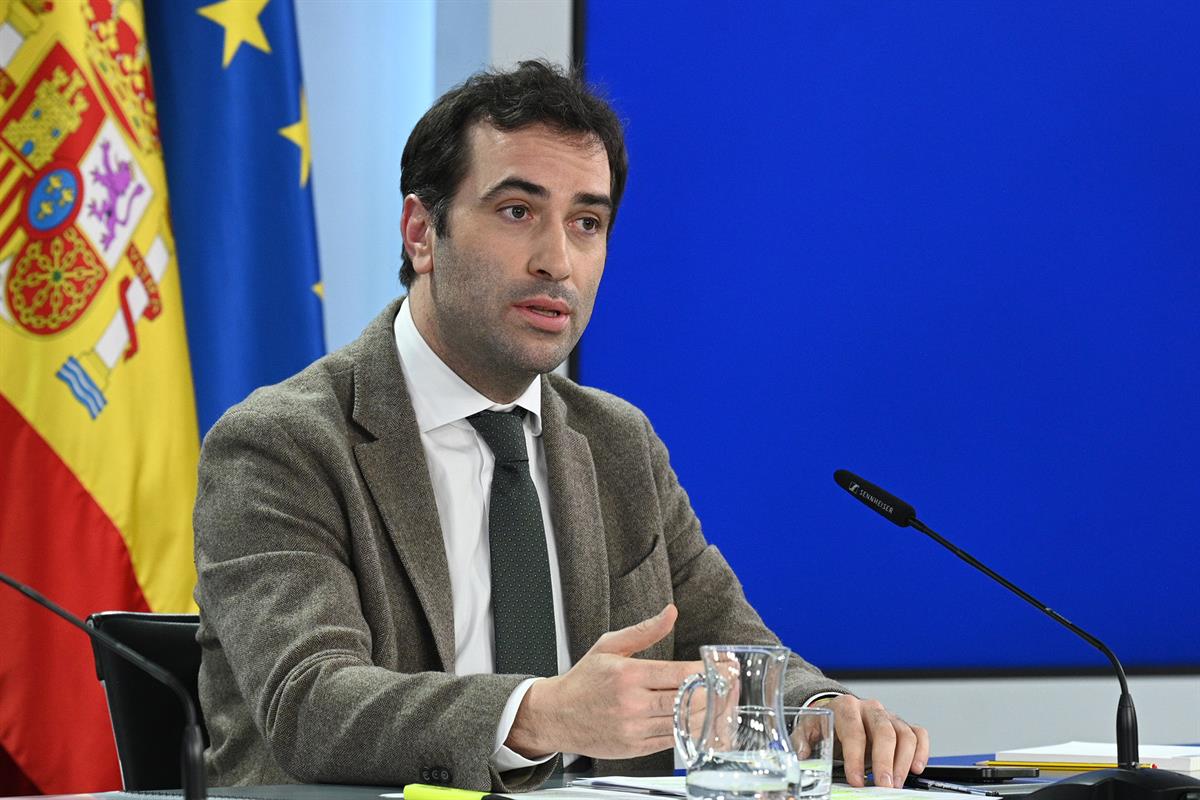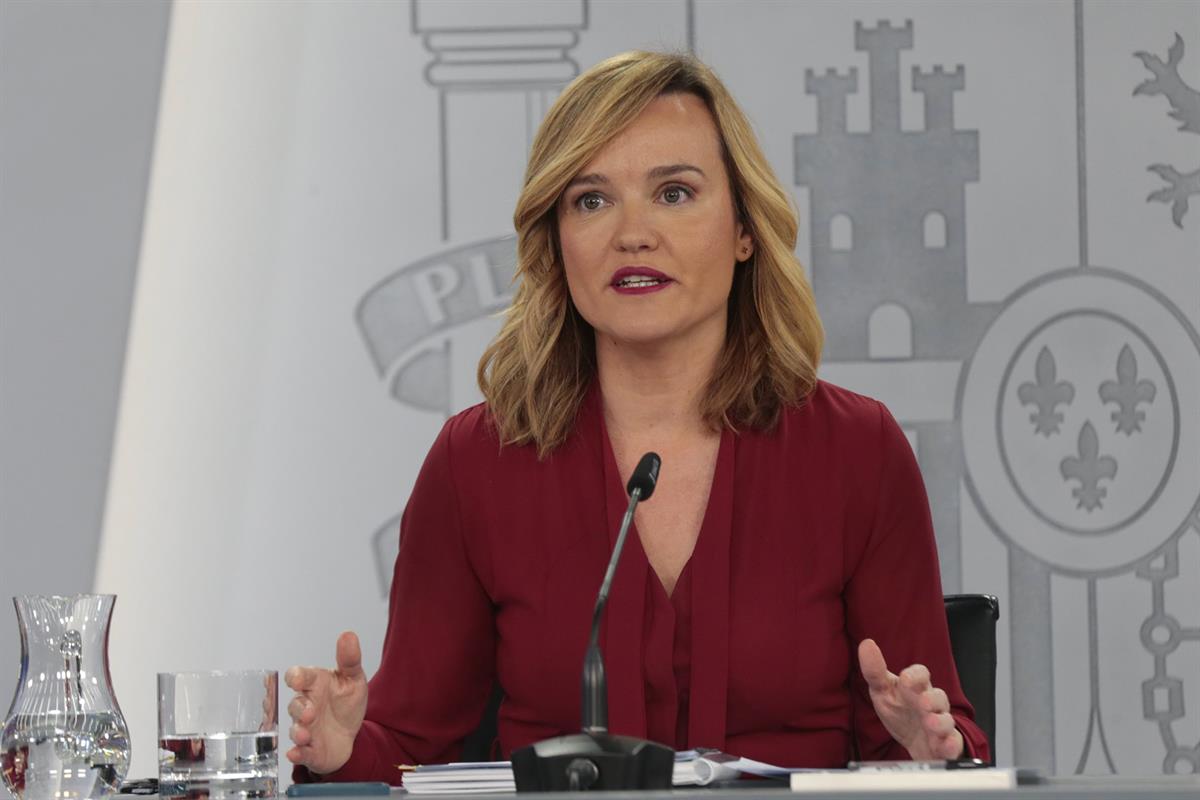Council of Ministers
Government of Spain completes financial customer protection system
Council of Ministers - 2024.3.19
Moncloa Palace, Madrid
The Council of Ministers has sent to Parliament the draft law creating the Financial Customer Ombudsman's Authority, a regulation defined by the Minister for Economy, Trade and Enterprise, Carlos Cuerpo, as the "keystone" of the system for protecting and including financial customers.
The project was approved by the Lower House of Parliament in the previous legislature, but fell before its final adoption. "It is precisely the text that came out of the Lower House that we are taking up, in the hope that it can be quickly backed by the majority there", said the minister, who defended the fact that it responds to a "public demand". The law is one of the milestones of the Recovery, Transformation and Resilience Plan in the field of modernisation of public administrations, and is planned to be in force before the end of the year.
The Financial Customer Protection Authority is set up as a body with functional independence for the out-of-court resolution of disputes between financial institutions and their customers. Cuerpo stressed that with its completion, "the work carried out in recent years with the codes of good practice that financial institutions have imposed on themselves is completed". In fact, the text strengthens the role of these protocols, assimilating them to rules of conduct, thereby making them mandatory.
Fast and free complaints for financial users
 The Minister for Economy, Trade and Enterprise, Carlos Cuerpo, during the press conference after the Council of Ministers | Pool Moncloa / Borja Puig de la Bellacasa
The Minister for Economy, Trade and Enterprise, Carlos Cuerpo, during the press conference after the Council of Ministers | Pool Moncloa / Borja Puig de la Bellacasa
The Minister for the Economy recalled that the current system for resolving disputes between financial institutions and customers consists of three successive levels: the institutions' customer services, the complaints services of the supervisory bodies - the Bank of Spain, the National Securities Market Commission (CNMV) and the Directorate General for Insurance - and the courts. The authority will integrate the functions of the supervisory bodies, allowing customers to submit their complaints free of charge and in an expeditious manner, as the maximum period for attention will be 90 days.
It will also resolve complaints regarding non-compliance with rules of conduct, good practices and protocols signed by institutions, including the unfairness of contractual clauses. As specific examples of possible claims, Cuerpo cited the charging of a commission not due to any service requested, the bank's refunding of a bill without informing the customer, the imposition of a specific appraiser when taking out a mortgage, and the refusal to pay for a home loss covered by insurance.
The minister pointed out that the scope of the new body will be very broad, covering all entities supervised by the Bank of Spain, the CNMV and the Directorate General of Insurance, fintech and crypto-asset services, and consumer lending or real estate credit services. The authority's decisions are binding when the amount claimed is less than €20,000. The body will be funded by a fee to be paid by financial institutions, which is intended as a "positive incentive", given that it will depend on the number of complaints against the institution and how many are resolved in favour of customers.
The regulation strengthens the personalised attention already developed in the codes of good practice, and is "particularly important in terms of adapting the actions of financial institutions to the specific characteristics of customers, such as age and possible disability, and vulnerable groups".
Distribution of €430 million to autonomous communities for housing rehabilitation
 The Minister for Housing and Urban Agenda, Isabel Rodríguez, during the press conference after the Council of Ministers | Pool Moncloa / Borja Puig de la Bellacasa
The Minister for Housing and Urban Agenda, Isabel Rodríguez, during the press conference after the Council of Ministers | Pool Moncloa / Borja Puig de la Bellacasa
The Council of Ministers has authorised the territorial distribution among the autonomous communities and the cities of Ceuta and Melilla, and the criteria for this distribution, of €430 million from the Recovery, Transformation and Resilience Plan (PRTR). The distribution was proposed unanimously at the Sectoral Conference on Housing and the Urban Agenda on 18 January.
The Minister for Housing and the Urban Agenda, Isabel Rodríguez, explained that these funds are earmarked for energy improvement works, such as replacing windows and heating, cooling and accessibility improvements, which is one of the demands of the elderly and disabled.
The minister also informed that the Government has decided to extend the deadline until 31 December 2024 for the autonomous communities to meet their objectives and execute the funds they have received. From 1 January 2025, funds that have not been spent can be redistributed to other communities that have spent theirs. The commitments made to the European Commission will thereby also be fulfilled.
Isabel Rodríguez added that the Government has also extended, until 31 March, the deadline for signing agreements to expand the stock of affordable rental housing. The Government's objective, she said, was to build 20,000 homes by 2026, but it has already surpassed this figure by almost 5,000 units in different phases: agreed, under construction and delivered.
In fact, this afternoon the minister will sign agreements with ten autonomous communities and more than 70 municipalities to build 3,200 additional homes. "With the recovery plan alone, we will be able to build 25,000 new affordable rental homes in our country," she stressed.
Rodríguez reiterated that one of the Executive's priorities is to ensure that citizens have access to decent and affordable housing, which is why it is making an unprecedented investment thanks to the recovery funds. "The hallmark of this government is its commitment to housing as the fifth pillar of the welfare state", she stressed.
Earmarking of EU funds: almost €10 billion for public housing
The Minister for Housing recalled that the recovery funds, obtained by the President of the Government, Pedro Sánchez, in 2020, have facilitated the implementation of the Spanish Urban Agenda: Urban Rehabilitation and Regeneration Plan, in cooperation with the autonomous communities, which is endowed with €5.52 billion.
Rodríguez detailed that of this amount, €3.42 billion is earmarked for rehabilitation (€2.97 billion for effective rehabilitation in homes and €450 million for tax deductions or incentives). Another €1 billion goes to the construction of social rental housing in energy-efficient buildings, €1.08 billion to the refurbishment of public buildings and €20 million to the design of urban agendas in the country's municipalities.
In this context, the minister announced that in the coming weeks, a further €4 billion in loans to developers, provided by the addendum to the recovery plan, will be added to this €5.52 billion for the promotion of new housing.
Isabel Rodríguez pointed out that "this will total €9.52 billion, or almost €10 billion earmarked for public housing policies".
Tax incentives
The rehabilitation programme, endowed with more than €3.42 billion, includes an allocation of €450 billion for tax incentives. During her appearance, the minister gave as an example that a person who invests €5,000 in changing the windows in their home to improve energy efficiency will receive a 40% subsidy of this cost, so they will only pay €3,000, and 20% of this will be tax deductible, which means that the final outlay will be €2,400.
Active stance against racism
 The Minister for Education, Vocational Training and Sports and Government Spokesperson, Pilar Alegría, during her speech at the press conference after the Council of Ministers | Pool Moncloa / José Manuel Álvarez
The Minister for Education, Vocational Training and Sports and Government Spokesperson, Pilar Alegría, during her speech at the press conference after the Council of Ministers | Pool Moncloa / José Manuel Álvarez
The Minister for Education, Vocational Training and Sports and Government Spokesperson, Pilar Alegría, has announced the approval of an institutional declaration on the occasion of the International Day for the Elimination of Racial Discrimination, to be held on 21 March.
According to Alegría, with this declaration, the Government of Spain reaffirms "its firm and active position against racism, xenophobia and any form of discrimination based on skin colour or place of origin".
Scholarships for the 2024-25 academic year are now open
Pilar Alegría also referred to the opening of the application period for the 2024-25 academic year scholarships aimed at students of Baccalaureate, Vocational Training and university studies. The call for applications, which will be open from today until 10 May, includes a new 5% increase in the income thresholds to compensate for the rise in inflation.
Another positive change is the reduction of the percentage of disability to 25% so that students with a moderate disability can also apply for these grants, the application period for which will open in the coming weeks.
Commitment against violence against women
The Government spokeswoman began her speech at the press conference by sending a message of "affection and solidarity" on behalf of the Government to the families of the six fatal victims and those injured in the hit-and-run during a traffic stop in Seville, and the "most absolute condemnation" of the murders of a woman and two girls, victims of male violence, in the last 48 hours.
"We are unable to imagine the immense pain of these families," said Alegría, who underlined the Government's "firm commitment to put an end to this structural violence that destroys the lives of so many women and families".
Non official translation





